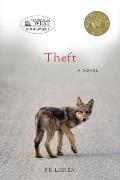Lauren Groff
Arcadia
William Heinemann, 2012
Bit Stone, the protagonist of this book, is the only son of Abe and Hannah, one of the founders of a commune under the name of Arcadia. A small society, Arcadia was organized in the fields of western New York State. Members of the commune created a system of efficient production, so that they provide themselves with everything necessary for life, not going beyond the community. Free People, they make decisions on the Council of the Nine, eat plant foods, do not keep animals, and have several wives and husbands. The nominal leader of Arcadia is Handy, hippie, rock musician of the 1970s, in the winter leaving to tour with a support group on their own bus, and all money raised at the concerts Handy brings to the commune. Arcadia is constantly replenished by the hippies, Darwinists, followers of the Buddha and other marginals seeking true freedom of spirit and body, but, however, often do not stay in Arcadia for long.
Bit at the beginning of the book is five years old, he was the first child born in the commune. Bit was the subject of unconditional love not only by their parents but the whole Arcadia. Bit never had been in the outside world, he knew about it only from what newcomers told him. Bit sometimes helps adults build something, and often plays with other children, Ike, Helle, Leif and Eric. Women work in Arcadia as well as men. People want to quickly finish the Arcadia, a large house, to move into it. But the commune is constantly having problems: with food, materials, lack of heating. Little Bit only later began to realize that his entire life in Arcadia he went half-starved, froze, and adults around had the bulging ribs and their skin was burned with the sun and almost always dirty because there was no place to wash, too.
Free People support their existence also with grass which grows in the fishing line nearby. The police often search the place, looking for the drugs, fugitives, who is really there, because nobody asks about someone else's past.
This novel consists of short chapters, each of which is a sort of short film, culminating in darkening, and after the blackout comes next chapter, usually not extending the previous directly. These short lyrical episodes in themselves are almost works of art; they are so fragile, precise and touching. And the novel itself is the same: it is not so much the view of utopia as a story of man, broken, but not discouraged and who doesn’t give up.
Near future in the book describes in a very conventional way: some virus is spreading, but the children are learning at schools, read books on e-readers, live in families, all remain the same. Bit for all the time he had lived in the outside world, it seems, and hadn’t felt happy, except the time when he just got married and his daughter was born. Even the circle of his contacts had not been expanded; he still maintains some kind of friendship with his peers from Arcadia.
Bit as a child has noticed a lot and drew some conclusions and, becoming a teenager, already understood how the world works. But Bit was raised in a world striving for complete freedom, and it prevents him from acting. He is seeing everything, but doing nothing. The action may damage the universe. Outside of Arcadia, naturally, he also finds no rest. His marriage to Helle initially could not lead to a successful union, but Bit had chosen it, because Helle was also from his past.
Returning in the in Arcadia, Bit can no longer remains in the new Arcadia, too much he saw, too much he lost. Model of a brave new world is no longer available to recover.
«Arcadia» is a book about how people who once lived in paradise, invented by themselves, are no longer able to leave this paradise. I wish there were more books like this one.




